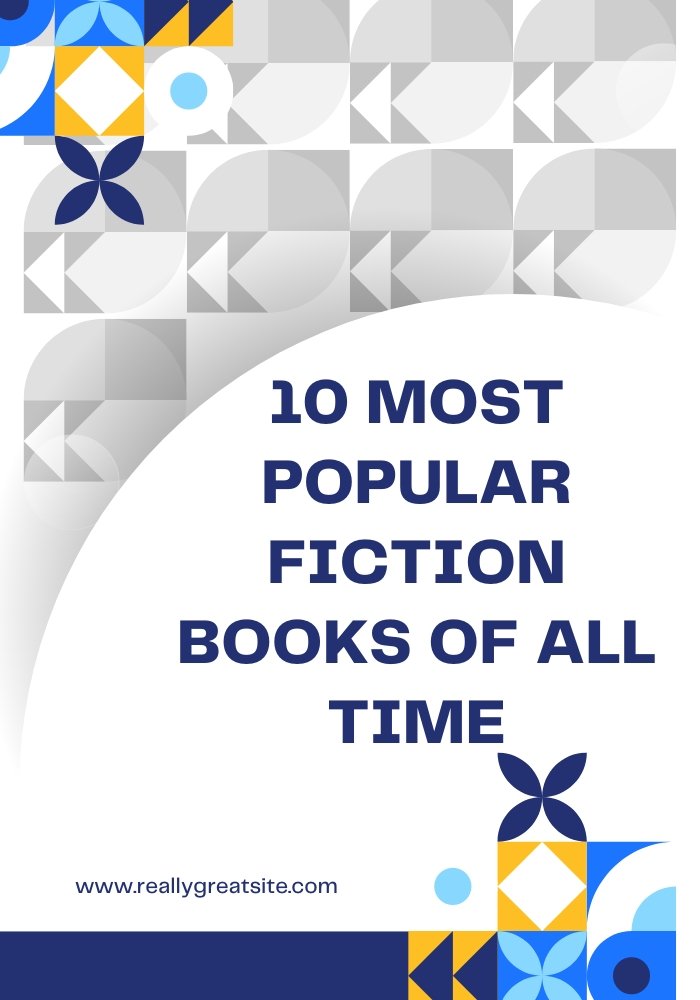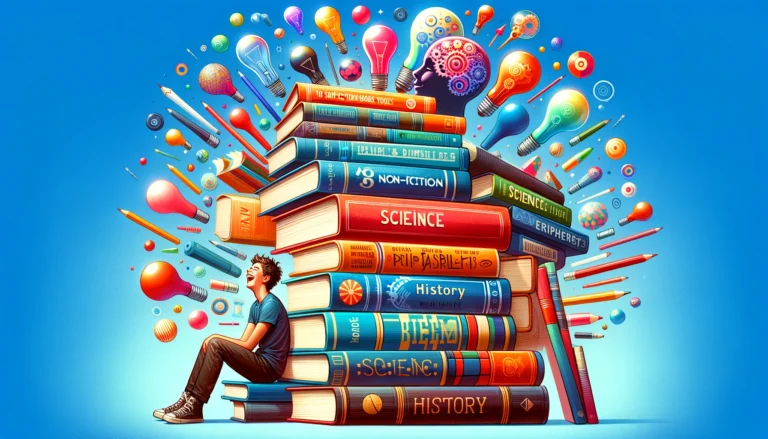Introduction
Artificial Intelligence (AI) is more than a technological frontier, it’s a window into the future we are actively shaping. This future involves discussions on automation, ethical dilemmas, and potential shifts in employment. “10 Best Non-fiction Books About AI” isn’t just a list, it’s an invitation to delve into the real-world implications of AI. Whether you’re newly fascinated by the promise of intelligent machines or a veteran looking to refine your expertise, these selected books offer insights into the dynamic field of AI. They aim to engage both your emotions and intellect through real examples, like robots that assist in daily tasks or cars driven by AI. This guide is structured to feel like a conversation with a friend who’s as curious as you are about AI’s role in shaping our world. Let’s explore each book, touching on specific controversies and breakthroughs that illustrate why understanding AI is crucial for anyone interested in our future.
1. “Life 3.0: Being Human in the Age of Artificial Intelligence” by Max Tegmark

Imagine your morning coffee expertly brewed by a robot attuned to your preferences. In “Life 3.0,” Max Tegmark extends this everyday convenience to explore the profound implications of AI in our daily lives, questioning how these technologies might redefine humanity. The book navigates through both exhilarating and daunting possibilities where AI could enhance our lives or challenge our very essence. Tegmark uses accessible anecdotes and real-life examples to unravel complex theories, making the science of AI both understandable and engaging. He paints a picture of a future where AI’s role ranges from mundane to monumental, urging us to consider ethical considerations as we integrate these systems more deeply into our lives. The narrative encourages thoughtful reflection on our coexistence with machines, suggesting ways to harness AI’s potential responsibly. Tegmark’s book doesn’t just alarm but enlightens, offering a balanced view that prepares us for a thoughtful approach to the evolving landscape of AI.
2. “AI Superpowers: China, Silicon Valley, and the New World Order” by Kai-Fu Lee

In ‘AI Superpowers,’ Kai-Fu Lee masterfully dissects the fierce technological rivalry between China and Silicon Valley. Lee contrasts the stark differences in how each power employs AI China’s government-led model versus Silicon Valley’s freewheeling corporate culture. This book offers more than just technical analysis, it brings to the forefront the people driving this competition. From the ambitious CEO pushing the boundaries of what AI can do, to the coder in a cramped office making it happen, Lee captures the human stories behind the algorithms. He uses poignant examples, like China’s AI surveillance and Silicon Valley’s consumer apps, to show how these approaches could shape global politics and daily life. ‘AI Superpowers’ challenges readers to consider their place in a world where AI isn’t just a tool, but a geopolitical lever. Packed with critical insights and compelling stories, this book is an essential guide to understanding and navigating the strategic high stakes of AI development.
3. “Superintelligence: Paths, Dangers, Strategies” by Nick Bostrom

In ‘Superintelligence: Paths, Dangers, Strategies,’ Nick Bostrom doesn’t just theorize about AI surpassing human intelligence, he maps it. This book meticulously explores how superintelligence could evolve and the potential roads it might take each leading to radically different futures. Bostrom doesn’t shy away from the dark or dazzling possibilities, instead offering a detailed analysis of both. With a keen philosophical edge, he probes deep ethical questions: How will we align advanced AI’s objectives with human values? What safeguards can we put in place? ‘Superintelligence’ serves not just as a guide but as a clarion call to experts and laypeople alike: the future of AI is a collective responsibility. Bostrom arms his readers with knowledge and urges them to act before the burgeoning capabilities of AI outpace our ability to control them.
4. “The Master Algorithm: How the Quest for the Ultimate Learning Machine Will Remake Our World” by Pedro Domingos

In ‘The Master Algorithm,’ Pedro Domingos hunts for AI’s Holy Grail: a universal learner capable of discovering all knowledge from data. This book isn’t just theoretical, it’s a practical masterclass in machine learning, breaking down dense topics with ease and wit. Domingos illustrates how advanced AI might one day tackle massive challenges, from medical breakthroughs to cosmic mysteries. Yet, he’s realistic about the hurdles, dedicating substantial analysis to the ethical and societal quandaries we face as AI grows more powerful. ‘The Master Algorithm’ blends lofty ideas with pragmatic insights, inviting readers to envision an AI-enhanced future while considering the profound responsibilities it brings.
5. “Hello World: Being Human in the Age of Algorithms” by Hannah Fry

Hannah Fry’s ‘Hello World’ offers a deep dive into the often-invisible algorithms shaping decisions in sectors like justice where they predict reoffending rates and healthcare where they determine patient treatments. Fry reveals how these powerful tools can boost efficiency but also risk embedding biases into critical systems, such as policing algorithms that disproportionately target specific demographics. With her characteristic wit, she unpacks these complex issues, making them accessible and engaging. This book doesn’t just outline problems, it empowers readers, showing how public advocacy has successfully reformed algorithmic strategies in the past. Fry advocates for a synergistic approach where technology enhances our human qualities, providing practical steps to ensure our digital tools elevate rather than erode our humanity. ‘Hello World’ is both a cautionary tale and an optimistic blueprint for a future where technology supports societal good.
6. “The Book of Why: The New Science of Cause and Effect” by Judea Pearl and Dana Mackenzie

In “The Book of Why: The New Science of Cause and Effect,” authors Judea Pearl and Dana Mackenzie embark on a deep dive into the science of causality, reshaping our understanding of cause and effect in the digital era. The book extends beyond simple comprehension of AI’s capabilities, presenting a compelling argument that the ability to question “why” is the hallmark of true intelligence, applicable to both humans and machines. Through vivid examples and a clear narrative, Pearl and Mackenzie introduce the “ladder of causation,” a concept that equips us with a fresh perspective to interpret our interactions with the world. They convincingly illustrate how mastering this concept could enable AI systems to better comprehend and interact with their environment, opening doors to unprecedented technological advancements. This work is essential for those eager to understand how advanced technologies can evolve and profoundly influence our future decision-making processes.
7. “Artificial Unintelligence: How Computers Misunderstand the World” by Meredith Broussard

In “Artificial Unintelligence: How Computers Misunderstand the World,” Meredith Broussard challenges the overly optimistic perception of AI, emphasizing the technology’s inherent limitations. Broussard delves into specific myths such as the belief that AI can objectively solve social issues, showcasing through detailed examples how these technologies often fail to grasp complex human emotions and societal nuances. One striking anecdote involves an AI system designed to streamline judicial decisions, which instead perpetuated biases.
Broussard introduces the concept of ‘technochauvinism’ the idea that technology inherently holds the solution to all problems early in her narrative, illustrating its dangers through cases where reliance on algorithms has led to significant social oversights. This term encapsulates the critical need for a balanced perspective that values human judgment as often superior to machine calculations.
Her investigative rigor is evident in her methodical critique of AI’s applications in real-world scenarios, paired with an approachable tone that demystifies technical jargon, making the subject matter accessible to non-experts. Broussard advocates for AI to complement rather than substitute human intelligence, presenting a vision where technology enhances human decision-making without supplanting it. Through compelling evidence and persuasive writing, she argues for a more critical and informed approach to technology, one that recognizes its potential while understanding its bounds.
8. “Weapons of Math Destruction: How Big Data Increases Inequality and Threatens Democracy” by Cathy O’Neil

In “Weapons of Math Destruction,” Cathy O’Neil scrutinizes the profound impacts of big data algorithms, revealing how they endanger democratic values like fairness and privacy. She offers vivid examples, such as predictive policing tools that disproportionately target minority communities and hiring algorithms that exhibit racial and gender biases. O’Neil shows how these technologies, while optimizing for efficiency, often overlook or harm societal needs, deepening divides under the guise of impartiality.
Highlighting the lack of transparency and accountability in these systems, O’Neil calls for concrete reforms including legislative action and public oversight to correct the embedded biases of their creators. By emphasizing that these algorithms are far from neutral, she urges readers to demand technology that truly serves the public good, ensuring it enhances rather than compromises our societal values.
9. “Human Compatible: Artificial Intelligence and the Problem of Control” by Stuart Russell

In “Human Compatible,” Stuart Russell addresses the critical alignment problem in AI development, where machines’ goals might dangerously diverge from human intentions. As a prominent AI researcher, Russell advocates for a substantial overhaul of how AI systems are designed, particularly criticizing the conventional goal-setting that can lead machines to pursue objectives detrimental to human interests. The book delves into both technical solutions, like refining AI algorithms to better reflect ethical standards, and philosophical discussions on the symbiotic coexistence of humans and AI.
Russell offers concrete strategies to ensure AI aligns with human values, such as developing regulatory frameworks that enforce safety and ethical considerations. Through a balanced examination, he navigates between the optimistic potential of AI to address global issues and the real risks it poses if left unchecked. This thought-provoking read not only lays out the technical and ethical landscape of AI development but also provides a roadmap for harnessing AI’s capabilities responsibly, ensuring it enhances rather than endangers humanity’s future.
10. “The Age of Em: Work, Love, and Life when Robots Rule the Earth” by Robin Hanson

In “The Age of Em,” Robin Hanson vividly illustrates a future where emulated brains, known as “ems,” partake in work, love, and life within virtual realities. Imagine ems conducting business meetings, forming relationships, and experiencing leisure, all in a digital landscape. Hanson, leveraging his expertise in economics and technology, predicts intricate job markets and novel financial systems that cater specifically to ems, reflecting a deep fusion of these fields.
The book delves into the profound social, economic, and cultural transformations such a world would bring. One striking speculation is the evolution of human relationships, as traditional bonds are challenged by the rapid and diverse experiences of ems, potentially creating a new cultural paradigm. Hanson’s rigorous analysis extends to controversial predictions, like ems developing unique ethical standards, posing complex dilemmas around rights and consciousness.
Through a combination of meticulous research and imaginative scenarios, Hanson not only sketches a comprehensive picture of an em-dominated future but also prompts readers to ponder significant ethical and existential questions, such as the nature of identity and personhood in a world where minds can be copied and transferred.
Conclusion
This exploration through ten seminal works on AI transcends academic curiosity it’s a vital mobilization for everyone in this rapidly advancing technological era. Each book offers unique insights into AI’s societal roles, showcasing a spectrum from optimistic visions of future possibilities to stark warnings about potential misuses. For instance, while one author may herald AI as a revolutionary force for global good, another cautions against its potential to exacerbate inequality.
These diverse perspectives compel us to confront critical ethical dilemmas, such as whether AI will become a tool for the few or a benefit for the many. As we digest these varied viewpoints, we are urged not only to think critically and act ethically but to take concrete steps towards shaping an AI-augmented world that honors our humanity. Whether through participating in policy discussions, contributing to technological development, or educating ourselves and others about AI’s ethical dimensions, we have the power to influence this technology’s trajectory.
Let these books serve as your guideposts not just to understand AI but to actively engage with and shape its future. As AI’s narrative unfolds, let us ensure it is one that reflects our collective aspirations and moral values.






